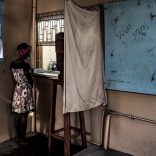Acute food insecurity affects nearly 4.9 mln people in Mozambique during 2024/2025 lean season: ...
Mozambique: Nyusi urged to declare state of emergency – AIM report

Photo: Miramar
Mozambique’s Council of State has called on President Filipe Nyusi to declare a state of emergency, in light of the Covid-19 crisis.
The Council of State is an advisory body, which the President must consult before issuing a declaration of war, or of a state of emergency.
Nyusi swore the members of the Council of State into office on Friday morning, and in the afternoon it held its first meeting. Covid-19 was the only point on the agenda, and the Council suggested that, in the light of the danger of a rapid spread of the disease, Nyusi should declare a state of emergency.
The government has already taken measures that some might argue are unconstitutional unless a state of emergency are declared. Thus, although nobody has protested, the restriction of gatherings to no more than 50 people is a violation of the freedom of assembly.
The Constitution established that a state of emergency can only be declared “in cases of actual or imminent aggression, a serious threat to or disturbance of the constitutional order, or a public disaster”. Covid-19 clearly falls into the category of a “public disaster”.
Once he has declared the state of emergency, the President must submit it to the country’s parliament, the Assembly of the Republic, for ratification within 24 hours. The Assembly has 48 hours to decide whether or not to ratify the state of emergency.
Under a state of emergency, measures may be taken to curtail individual rights and freedoms, including freedom of assembly and freedom of movement, and to allow the government to requisition goods and services.
A state of emergency lasts for 30 days and can be renewed twice. Under the Constitution, there is no way that a state of emergency can last for more than 90 days.
When the state of emergency is over, the President must address the Assembly of the Republic with detailed information on the measures that were taken.
In its entire history, Mozambique has never before declared a state of emergency, despite the wars of aggression waged by Ian Smith’s Rhodesia and by apartheid South Africa, and despite the major floods and lengthy periods of drought that have hit the country.













Leave a Reply
Be the First to Comment!
You must be logged in to post a comment.
You must be logged in to post a comment.